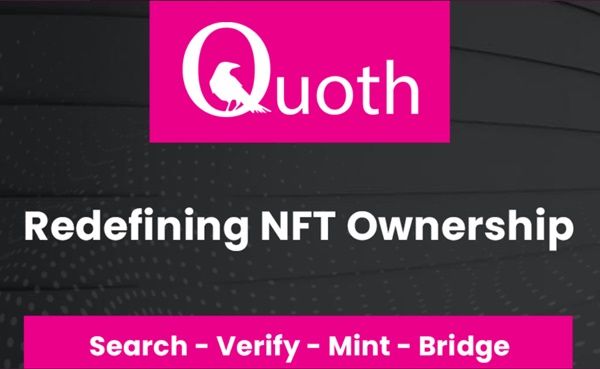Will the Quoth protocol redefine current blockchain standards? Find out all the features of this protocol and its native token.

Quoth protocol will redefine the blockchain standards of today.
Redefining NFT ownership through infrastructure, Quoth’s oracle API and SDKs enable any wallet, marketplace or protocol to accurately search and list authenticated NFTs. Its artificial intelligence is in the process of indexing every NFT in existence into a comprehensive data set.
The platform offers a Google-like NFT search by using everyday semantics combined with machine learning. Instant oracles offer authentication and suggested behavioral NFT buy lists. Furthermore, the platform offers all-chain fractional bridging.
Quoth Utility
The native cryptographically-secure fungible protocol token of Quoth (ticker symbol Quoth Token) is a transferable representation of attributed utility functions specified in the protocol/code of Quoth. It is obvious that it is designed to be used only as an interoperable utility token on it.
The token is based on the BSC BEP20 contract. The contract on the Binance network will be expanded with additional functionality to enable the liquidation of the token when its counterpart is released on the Ethereum side.
Additional information, such as font, background and the link to the image, will be supplied by an additional contract to be able to preserve the original metadata unchanged, which will store the link to additional metadata. When transferring a token from one network to another, the link to the meta information remains original and unchanged.
Quoth Token is a functional multi-utility token which will be used as the medium of exchange between participants on Quoth in a decentralised manner.
Supply (MAX 55,000,000 tokens):
- User rewards for rewards for neural net training and IA results feedback
- Rewards for running on-chain oracles used to serve API endpoints
- Rewards for bridge staking
The objective:
The goal of introducing token is to provide a convenient and secure mode of payment and settlement between participants who interact within the ecosystem on Quoth without any intermediaries such as centralised third party entity/institution/credit.
There will be three ways in which users can earn from Quoth. First, in the training process of some AI elements, users will be able to participate in the neural net training results feedback technology that will enable certain machine learning features to get the data they require. This human input element will be rewarded in native $QUOTH tokens. Next, the reward for running on-chain oracles geared to serve the endpoints associated with the protocol APIs.
Finally, bridge staking (to maintain network security) will also be available and rewarded. The token will be used in many cases, as users will need it to access the APIs of different channels. Payments will be made in $QUOTH tokens. Other transactional demand volumes will take the form of paying bridging and staking fees to secure the bridge.